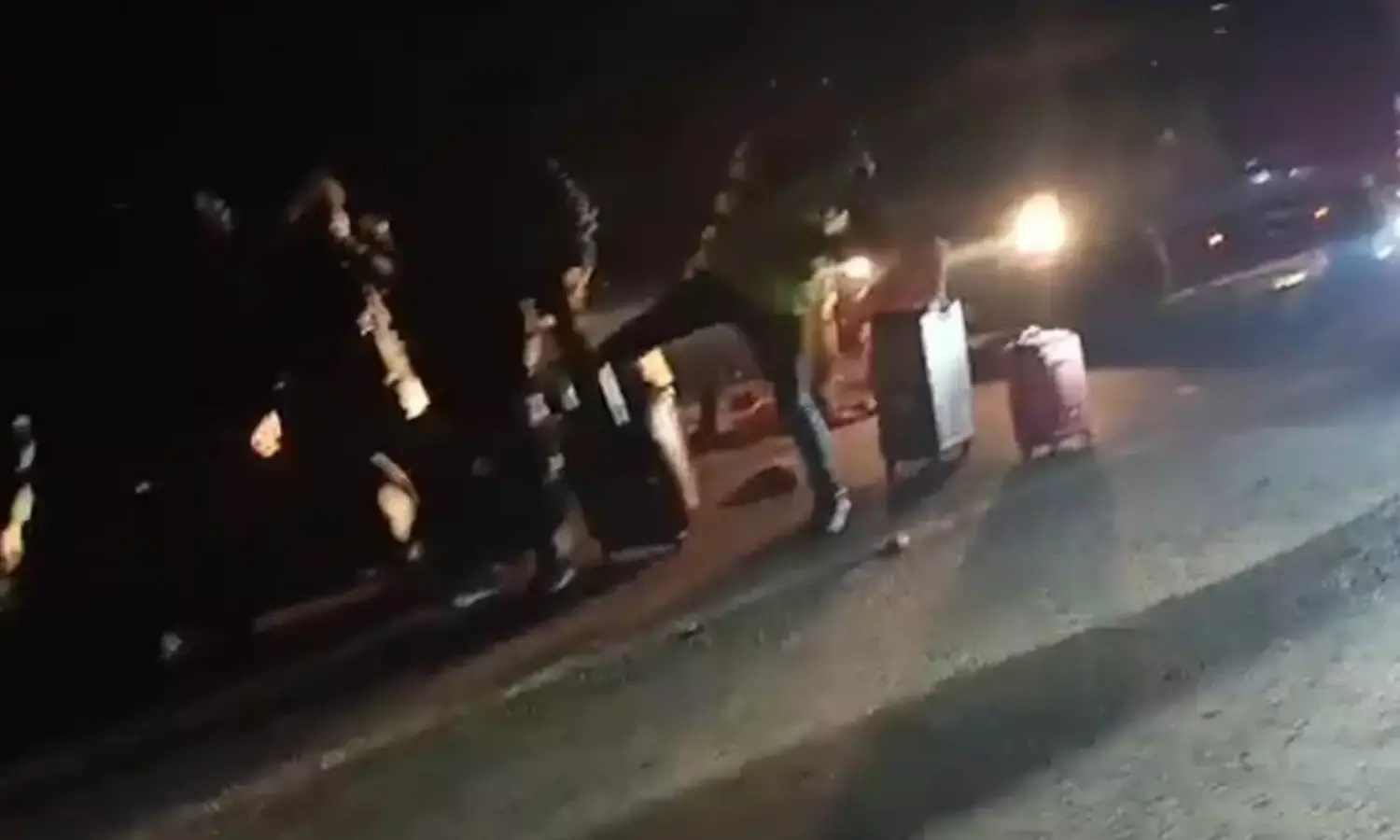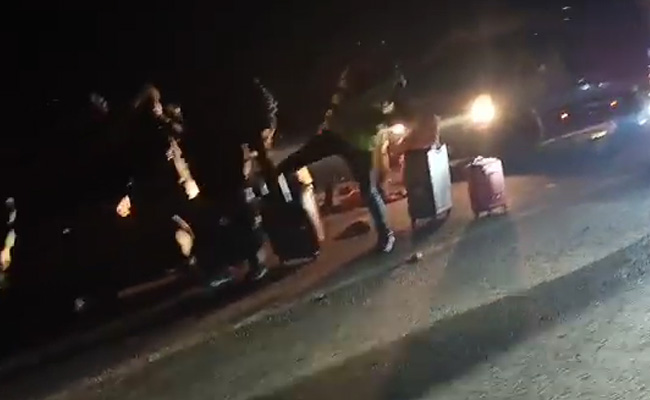‘We Might Be Running Out of Supplies Soon’ - Indian Students Trapped in Ukraine
‘I am back in my hostel now and I am preparing a list of the students here.’

As news spread of Russia’s impending invasion, Uzair Hamid Bhat, an MBBS student from Kashmir studying at the Lviv National Medical University and a group of other Indian students anxiously started making plans to flee the country. On Thursday they were told by the Indian embassy to go to the Polish-Ukrainian border and everything would be taken care of there. After some 30 gruelling hours of travel by taxi and on foot in freezing temperatures, waiting in queues, with no food and no sleep, they finally reached the Polish border, only to be turned away. They received a notification there that only Polish citizens and Ukrainians would be allowed to cross.
Call it misinformation, dated information, lies or a nonchalant attitude to people in crisis, this shouldn't have happened. It was a matter of life or death. Uzair, for instance, had initially planned to travel to the Hungarian border, anticipating a larger influx at the Polish border closer by, making it more difficult for them to get through. But his friends weren't willing to travel that far, and as they had also been advised by the Indian embassy to go to the Polish border, they decided that would be better. Uzair decided to join them although he didn't think the plan would work.
His fears came true. Uzair recalls, "As we approached the Polish border, the taxis we were crammed up in left us almost 34 kms away from the checkpoint due to the traffic. We had to walk the rest of the way, the weather was freezing (-7 degree Celsius), our muscles were sore, we didn't have food or enough water and it had been almost 16 hours without sleep. Fortunately, the Ukranians had set up health camps where we got some tea and coffee."
"When we finally reached the checkpoint we realised that they were only letting Ukranians and Polish citizens pass through, along with US nationals. People from Bangladesh, India, Africa and some other countries were turned away. So we walked back a bit and made a fire. There was a supermarket but it was empty, we managed to get some water to hydrate ourselves though.”
“I tried to sleep but I couldn't. After about 12 hours, the crowd kept growing and we were suddenly up against thousands of Ukrainian armymen. I saw people collapsing, having seizures. I couldn’t help though I had studied medicine, because if I had even bent down I would have been crushed. I was separated from my group amidst all the chaos. I ran into the forest. The army was at my back, I was chased by army dogs. I somehow made it to another checkpoint.”
“At the checkpoint, I was told that the Polish government never got any information from India. In fact, we even got a notification from the Polish border saying only Ukrainian and Polish citizens will be allowed to pass through. Even as I was receiving this notification, I kept getting messages from the Indian embassy to go to the Polish border.”
“I was alone now. So I decided to go back. I walked for hours. The Ukrainian army tried to talk to me. When I told them I was going back to Lviv, they let me go. I made myself a fire. I tried to find a bus. After a few hours, there was one person ferrying Ukranians. I paid a lump sum and managed to get on it to go to Lviv. I was so comforted when we arrived in Lviv. I am back in my hostel now and I am preparing a list of the students here. We’re planning to try escaping through the Hungarian border now.”
Their parents back home are anxious. The father of a student from Kerala studying at the same university says he had received news from his son that they were turned away at the Polish border checkpoint. While his son decided to try escaping through Hungary, his father, who wishes to remain anonymous, advised him against it, saying it would probably be the same case there and they would just end up exhausting themselves for no reason.
He also mentioned that his son and the others in the group have managed to cross one checkpoint now, but need to cross one more. Once they cross over to Poland, arrangements have reportedly been made for their accommodation and food.
Nearly 15,000 Indian students are stranded in Ukraine. Many have the same story to tell, one of anxiety and fear. The escalating situation is hampering their access to basic facilities like food, water and money. Hazim Mir, a medical student from the Ternopil National Medical University told The Citizen, “We looked at our phones in silence and tracked all the places where the bombs and missiles were landing. My friends and I are in fear that it might reach here soon. Local citizens are trying to collect every possible food item from the market as we might be running out of supplies soon.”
The Indian embassy in Ukraine issued an advisory to all Indian nationals in the country. “In this difficult situation, the Embassy of India requests Indians to continue to remain strong, safe and alert, Embassy is working round the clock to support the Indian community in Ukraine and are working to establish evacuation routes from Romania and Hungary.”
Nearly 400 students in Sumy who have taken shelter in a basement after Russian forces took control of the city have appealed to the Indian government to evacuate them. Awanish Kumar, an Indian student In Ukraine is pessimistic that he will get out of the country any time soon. “I am safe for now but there is no solid plan. It had been coming for weeks now, everybody knew about the tensions and serious consequences of war in Ukraine. The evacuation action should have been started before. Now, with the air space being closed, how can we go home?”
Kumar is also stressed as he is unable to talk to his parents due to the internet not working in the area. “I had to wait for hours to withdraw cash from the ATM machine, but I wasn’t able to because it had run out of cash,” he added.
On Thursday, Indian ambassador Partha Satpathy said “The air space is closed, railway schedules are in flux and roads are crammed. I would request everyone to stay calm and face the situation with fortitude”. He also urged Indian citizens in Ukraine to stay in familiar locations, and those who are stranded “to get in touch with friends and colleagues, so that they can temporarily lodge there.”
Students are out of food and money and fearful of something bad happening. According to Rasiq, another student at Ternopil, “Colleges informed us one day prior to the invasion by Russia and decided to hold the online classes. If they had told us the same some time ago and if there was a proper communication from the Indian as well as Ukrainian government, we could not have been in this situation, with no practical possibility of returning home.
“We can’t buy food as the market is hardly open. ATMs are out of money, the internet is not working properly. We are fearful and stressed and at the same time not able to connect with our parents regularly”. Rasiq and his friends tried last minute to book a plane to flee from the country for the price of 50,000 Rs per person. “We were ready to pay that much money but as the airspace was closed there was no place to go”.
According to the country’s Ministry of Education and Science there are over 18,095 students from India in Ukraine, most of whom have gone there to pursue medical education. While about 1,000 Indians have been evacuated so far, the rest are still stranded in the country and others at the Polish, Hungarian and Romanian borders.
Meanwhile, a video went viral on social media recently where Ukrainian forces were seen assaulting an Indian at the Polish border. Some claim that they are facing ire due to India’s UN move, where it abstained from voting on a resolution condemning Russia’s invasion of Ukraine. Referring to India’s close ties with Russia, Ukrainian envoy Igor Polikha recently called India a “very influential global player” and sought Prime Minister Narendra Modi’s intervention in dissuading Putin.
)
Cover Photograph NDTV



